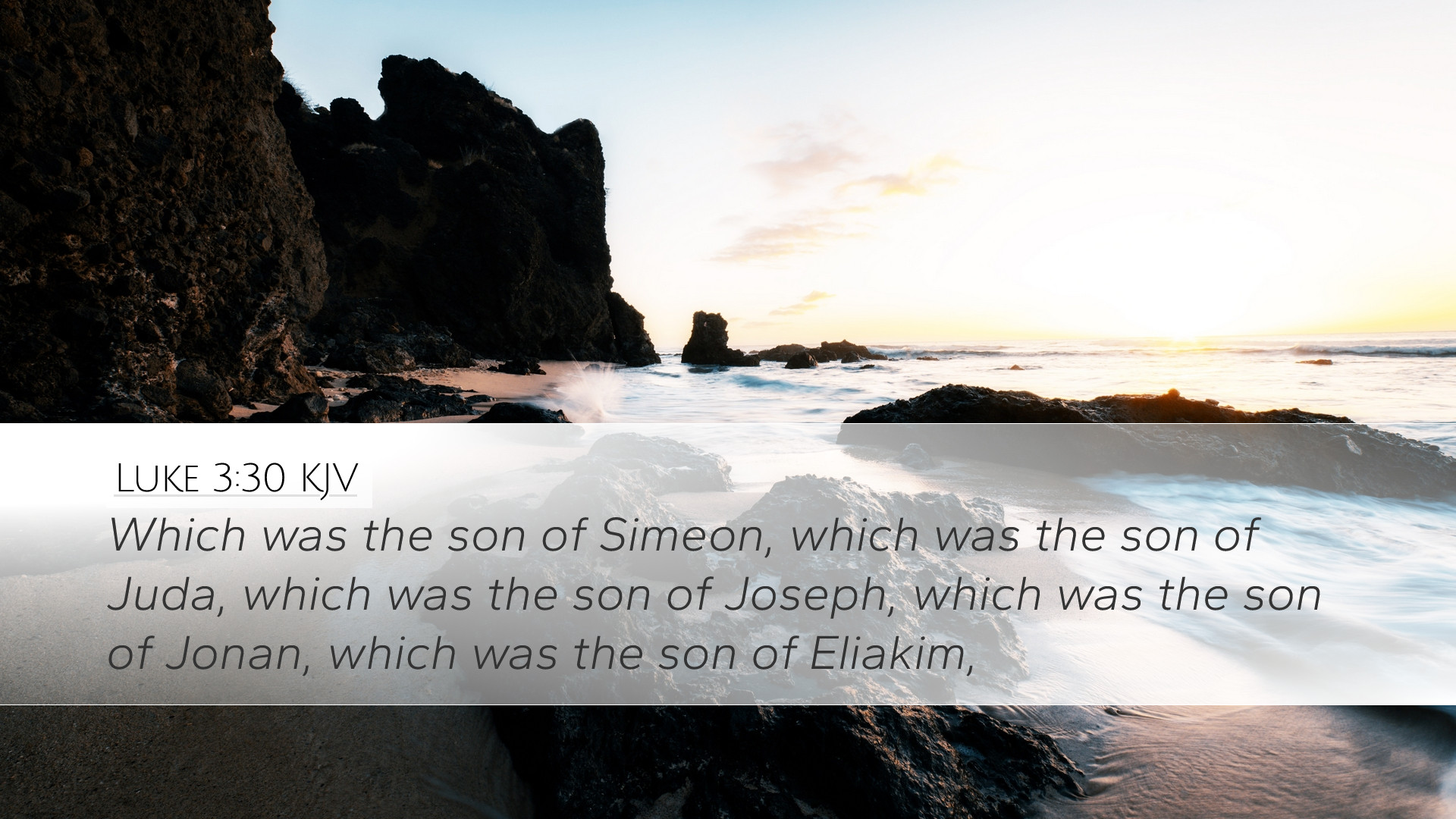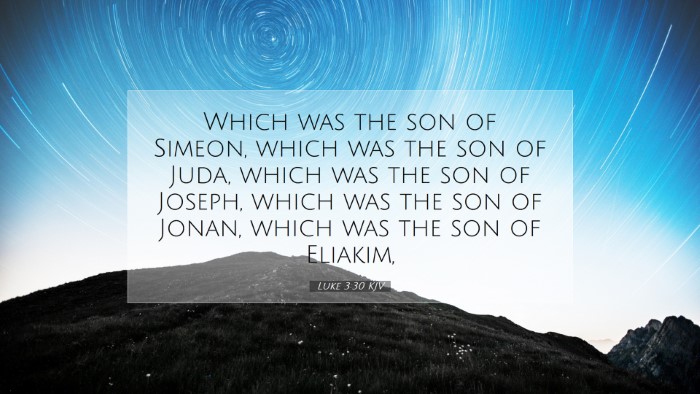Commentary on Luke 3:30
Luke 3:30 states:
"And the son of Levi, the son of Simeon, the son of Aggaeus."
This verse is often overlooked in the grand narrative of the genealogy presented in the Gospel of Luke. However, it carries significant theological implications and insights worth exploring.
Contextual Understanding
The Gospel of Luke is unique among the Synoptic Gospels as it emphasizes the inclusivity of the gospel message. This genealogy serves to link Jesus to a larger history of Israel, illustrating His rightful place in the lineage of David and the fulfillment of Old Testament prophecies.
The Importance of Genealogies
1. Establishing Legitimacy: The genealogies in the Bible, particularly in the Gospels, serve to establish the legitimacy of Jesus as the Messiah. By tracing His lineage back through notable figures, such as David, Luke reinforces Jesus’ identity as the promised King.
2. Fulfillment of Prophecy: Throughout the Old Testament, prophecies concerning the lineage of the Messiah highlight the significance of certain ancestors. In noting the son of Levi, Luke connects Jesus to the priestly order, suggesting a dual role as King and Priest, which would fulfill the covenant promises to both Judah and Levi.
Insights from Public Domain Commentaries
Matthew Henry's Commentary
Matthew Henry underscores the overarching theme of redemption that permeates the genealogical lists. He notes that these lineages serve to remind readers of God's faithfulness to His promises, as each name represents a story of divine grace amidst human failure. The mention of Levi reminds us of the priestly line from which Jesus arises, thereby establishing His qualifications to mediate between God and mankind.
Albert Barnes' Notes on the Bible
Albert Barnes provides a detailed analysis of the significance of the Levitical lineage in the context of the New Covenant. He points out that Levi, as a tribe set apart for priestly service, highlights the transition Jesus embodies—from the old priestly system to the ultimate Priest who offers Himself as the sacrifice. Barnes emphasizes the transformative nature of Jesus’ ministry, which reconfigures access to God.
Adam Clarke's Commentary
Adam Clarke elaborates on the roles of the Levites within the Israelite community and their importance in worship and liturgy. Clarke connects the Levites’ duty to the ministry of Jesus, explaining that while the Levites served in the temple, Christ serves in heaven, becoming the eternal mediator. This parallel not only enriches our understanding of Jesus’ role but also calls believers to view Him as the ultimate fulfillment of what the Levitical priesthood represented.
Theological Implications
The inclusion of Levi's offspring in Jesus’ genealogy invites deeper reflection on our understanding of priesthood. The Levites were responsible for teaching the law, guiding worship, and maintaining the holiness of the community. In Jesus, those roles are taken to their zenith as He embodies the law and becomes the moral and spiritual guide for all humanity.
The Transition to a New Covenant: As Jesus represents a new covenant, the mention of Levi contrasts the old covenant limitations. The priesthood of Levi required continual sacrifices, whereas Christ, as the High Priest according to the order of Melchizedek, offers a singular, perfect sacrifice.
Practical Applications
The implications of Luke 3:30 extend to contemporary discipleship and ministry:
- Understanding Our Heritage: Just as Jesus' genealogy links Him to His heritage, believers today are called to understand their spiritual roots and how they fit into the larger family of God.
- Emulating Christ's Priesthood: Believers are a royal priesthood (1 Peter 2:9) and are called to mediate grace, provide ministry to others, and reflect Christ in our daily lives.
- Grace Amidst Human Imperfections: The genealogy reminds us that God works through imperfect people to fulfill His divine purposes. This should encourage us to rely on God's grace in our own lives and ministries.
Conclusion
The simple mention of Levi within the genealogy of Jesus in Luke 3:30 ultimately reveals profound truths about Jesus’ identity, His purpose, and our role as believers. As we reflect on these insights, let us be reminded of the gracious inclusion we have in God's family and our call to serve as ambassadors of His kingdom.


